In this short video, I present a recent article on religion and leadership published in the Academy of Management Perspectives ‘Faith and Management Symposium August 2019 Issue.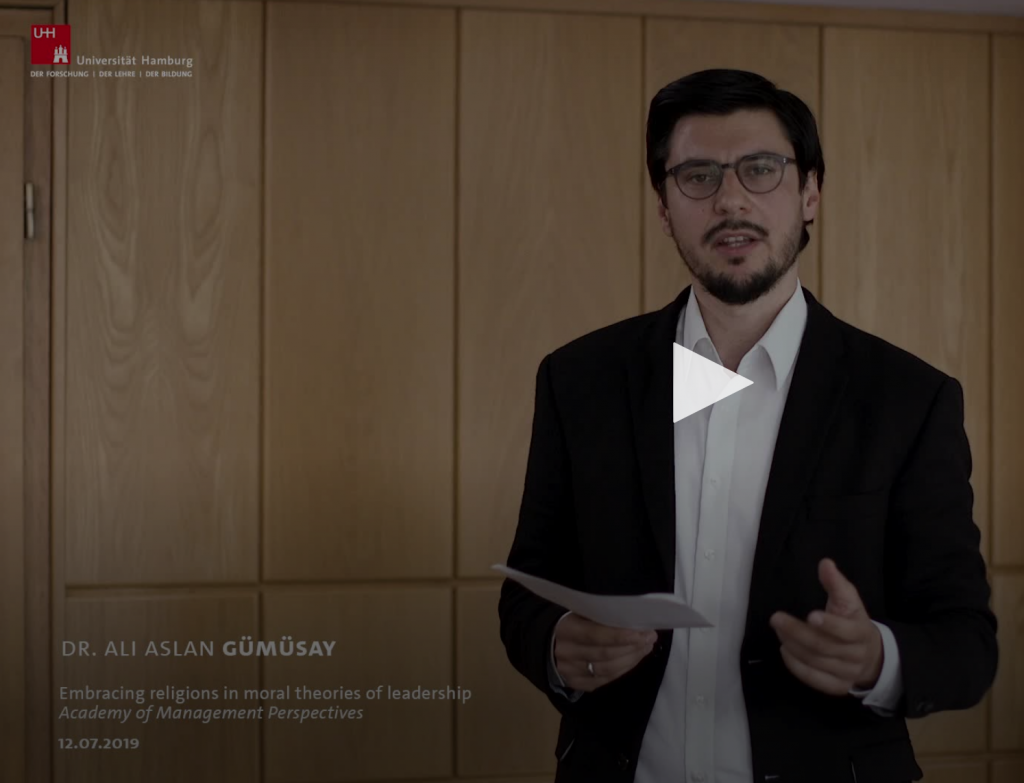
Unity in Diversity in Organizations & Society
A new article co-authored with colleagues Michael Smets and 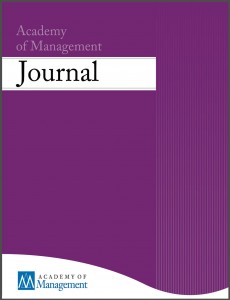 Tim Morris has been published at the Academy of Management Journal. It is entitled ‘God at Work’: Engaging central and incompatible institutional logics through elastic hybridity and examines how the first Islamic Bank in Germany maintains unity in diversity by forming what we call an elastic hybrid that remains resilient despite contradictory beliefs and values that persist over time. We show how the bank is capable of institutionally bending without organizationally breaking enabling individuals to practice more of their personal convictions at work while still experiencing a sense of shared organizational purpose.
Tim Morris has been published at the Academy of Management Journal. It is entitled ‘God at Work’: Engaging central and incompatible institutional logics through elastic hybridity and examines how the first Islamic Bank in Germany maintains unity in diversity by forming what we call an elastic hybrid that remains resilient despite contradictory beliefs and values that persist over time. We show how the bank is capable of institutionally bending without organizationally breaking enabling individuals to practice more of their personal convictions at work while still experiencing a sense of shared organizational purpose.
Implications for politics
Implications for politics can be read in-between the lines: Populist advocate for homogeneity as it reduces complexity. It puts us into boxes and separates us. Populists stand for this approach. Effectively, they compartmentalize societies. In contrast, heterogeneity is much more challenging, but also more rewarding. Heterogeneity is not just blending: we do not become all the same, but we cope with this diversity – with unity in diversity. Our societies become elastic, accommodating, and enriched by plurality. I believe, this is one of the fundamental social and societal challenges of our time: do we embrace the complexity of humankind or do we attempt to reduce it?
Organizational Scent
Happy to announce that a new article co-authored with Markus Höllerer and Renate Meyer has been published in M@n@gement (Vol. 21, Iss. 4). Free to download here.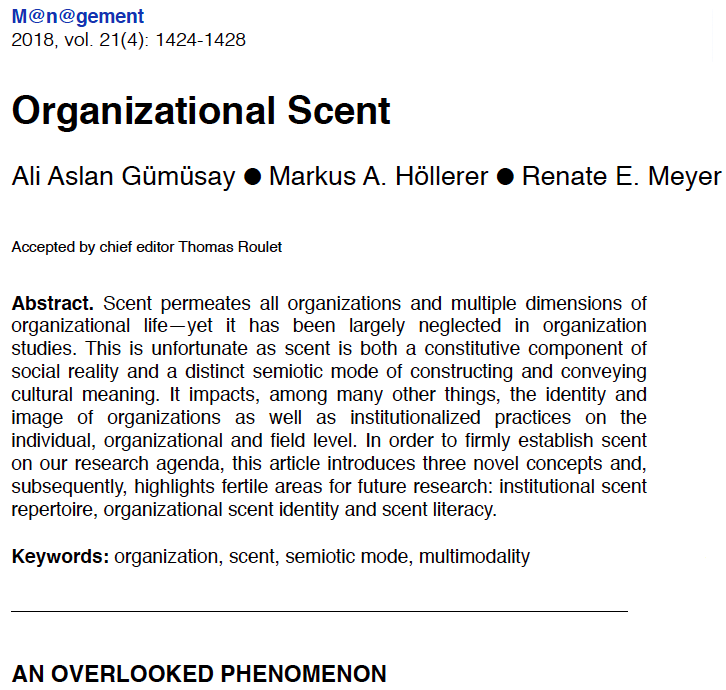
Bildungsrealismus & -pragmatismus
Kommentar zum Artikel “Genug der Apokalypse”
Professor Pörksen spricht von der Mitte der Gesellschaft, sieht sie aber meines Erachtens nicht in der Gesamtheit, sondern vielmehr im Durchschnitt. Es geht uns in der Tat durchschnittlich sehr gut. Sozial bröckelt es an den Rändern: Antisemitismus, Übergriffe auf Minderheiten und Geflüchtete. Die AfD symbolisiert und repräsentiert diese Trends – am rechten Rand. Die Benennung dieser Phänomene ist kein Fatalismus, auch wenn sie fatal ausfallen könnten, und kein apokalyptischer Pessimismus, auch wenn sie in einer Apokalypse münden könnten. Sie sind vielmehr eine reale und realistische Zustandsbeschreibung. Recht hat Herr Pörksen, wenn er schreibt, die Argumentation darf nicht deterministisch geführt werden. Die Temporalität des Seins wird häufig übersehen und von der AfD zum Nationalsozialismus ist es ein weiter Weg. Aber: wenn jemand wie Professorin Foroutan von präfaschistischen Zeiten spricht, dann ist es genau das Präfix „prä“, das eine solche Relation herstellt und uns wachrütteln – nicht resignieren – lassen soll. Es ist keine apocalypse now, aber eben durchaus möglicherweise eine apocalypse tomorrow.
sieht sie aber meines Erachtens nicht in der Gesamtheit, sondern vielmehr im Durchschnitt. Es geht uns in der Tat durchschnittlich sehr gut. Sozial bröckelt es an den Rändern: Antisemitismus, Übergriffe auf Minderheiten und Geflüchtete. Die AfD symbolisiert und repräsentiert diese Trends – am rechten Rand. Die Benennung dieser Phänomene ist kein Fatalismus, auch wenn sie fatal ausfallen könnten, und kein apokalyptischer Pessimismus, auch wenn sie in einer Apokalypse münden könnten. Sie sind vielmehr eine reale und realistische Zustandsbeschreibung. Recht hat Herr Pörksen, wenn er schreibt, die Argumentation darf nicht deterministisch geführt werden. Die Temporalität des Seins wird häufig übersehen und von der AfD zum Nationalsozialismus ist es ein weiter Weg. Aber: wenn jemand wie Professorin Foroutan von präfaschistischen Zeiten spricht, dann ist es genau das Präfix „prä“, das eine solche Relation herstellt und uns wachrütteln – nicht resignieren – lassen soll. Es ist keine apocalypse now, aber eben durchaus möglicherweise eine apocalypse tomorrow.
Es braucht also einen Realismus in der Zustandsbeschreibung und dann zielgerichtete Lösungsansätze. Gerne können diese auf eine optimistische Gesellschaft treffen. Nur müssen sie sich in der Realität bewähren. Herr Pörksen schreibt, Pessimismus sei der Mangel an Ideen. Jein! Es bedarf Ideen, aber eben auch der Umsetzung. Innovation ist Idee plus Implementierung. Ich denke, Ideen haben wir einige. Es fehlt an der Fähigkeit und den Willen mit pluralen Meinungen und Ideen gemeinsam umzugehen, um Einheit in Vielfalt zu schaffen. Dafür braucht es nicht einfach einen Bildungsoptimismus, sondern eine Bildungsbefähigung: eine Ermächtigung durch Bildung und Wissenschaft, um einerseits mit pluralen Ansätzen umgehen und anderseits die großen gesellschaftlichen Herausforderungen unserer Zeit angehen zu können.
Mit anderen Worten: es braucht einen Bildungsrealismus & -pragmatismus.
Ein paar weitere Gedanken hier unter ‘Weisheit’ und hier zur Humboldt’schen Bildungsrenaissance.
.
Gesellschaftliche Herausforderungen
“…ein Sturm weht vom Paradiese her…” – Walter Benjamin
Wir leben in interessanten Zeiten. ‚Interessante Zeiten’ ist Teil einer Redewendung, die auch als chinesischer Fluch bezeichnet wird. Mit Blick auf den wachsenden Populismus in Europa und der Welt passt es also recht gut, von interessanten, schwierigen, bedrückenden Zeiten zu sprechen – und zu schreiben.
Im Rückblick wie im Ausblick der Societas Futura Konferenz schweifen meine Gedanken daher sehnsüchtig zurück in die Zukunft. Wie wichtig fiktionale Erwartungen sind, zeigt insbesondere auch der Soziologe und aktuelle Gewinner des Leibnitz-Preises Jens Beckert (2018) auf. Insofern stellen sich zukunftsgewandte Fragen, wie wir die Gegenwart gestalten wollen, um eine Zukunft zu erleben, in der wir uns in den Spiegel schauen können werden. Denn eine societas futura ist ein (nur) scheinbar paradoxes, zukunftsgerichtetes Projekt der Gegenwart.
 Dieses Spannungsfeld der Temporalität des Wirkens, in der eben nicht nur Vergangenheit zählt, sondern auch die Zukunft auf uns einwirkt, hat Walter Benjamin (2010) treffend umschrieben: „Es gibt ein Bild von Klee, das Angelus Novus heißt. Ein Engel ist darauf dargestellt, der aussieht, als wäre er im Begriff, sich von etwas zu entfernen, worauf er starrt. Seine Augen sind aufgerissen, sein Mund steht offen und seine Flügel sind ausgespannt. Der Engel der Geschichte muß so aussehen. Er hat das Antlitz der Vergangenheit zugewendet. Wo eine Kette von Begebenheiten vor uns erscheint, da sieht er eine einzige Katastrophe, die unablässig Trümmer auf Trümmer häuft und sie ihm vor die Füße schleudert. Er möchte wohl verweilen, die Toten wecken und das Zerschlagene zusammenfügen. Aber ein Sturm weht vom Paradiese her, der sich in seinen Flügeln verfangen hat und so stark ist, daß der Engel sie nicht mehr schließen kann. Dieser Sturm treibt ihn unaufhaltsam in die Zukunft, der er den Rücken kehrt, während der Trümmerhaufen vor ihm zum Himmel wächst. Das, was wir den Fortschritt nennen, ist dieser Sturm.“
Dieses Spannungsfeld der Temporalität des Wirkens, in der eben nicht nur Vergangenheit zählt, sondern auch die Zukunft auf uns einwirkt, hat Walter Benjamin (2010) treffend umschrieben: „Es gibt ein Bild von Klee, das Angelus Novus heißt. Ein Engel ist darauf dargestellt, der aussieht, als wäre er im Begriff, sich von etwas zu entfernen, worauf er starrt. Seine Augen sind aufgerissen, sein Mund steht offen und seine Flügel sind ausgespannt. Der Engel der Geschichte muß so aussehen. Er hat das Antlitz der Vergangenheit zugewendet. Wo eine Kette von Begebenheiten vor uns erscheint, da sieht er eine einzige Katastrophe, die unablässig Trümmer auf Trümmer häuft und sie ihm vor die Füße schleudert. Er möchte wohl verweilen, die Toten wecken und das Zerschlagene zusammenfügen. Aber ein Sturm weht vom Paradiese her, der sich in seinen Flügeln verfangen hat und so stark ist, daß der Engel sie nicht mehr schließen kann. Dieser Sturm treibt ihn unaufhaltsam in die Zukunft, der er den Rücken kehrt, während der Trümmerhaufen vor ihm zum Himmel wächst. Das, was wir den Fortschritt nennen, ist dieser Sturm.“
Die Arbeit der Zivilgesellschaft ist beides: zugleich Objekt der Betrachtung und Subjekt-Aktivierung. Zivilgesellschaft, ruhe dich nicht aus. Dafür sind die Zeiten zu ‚interessant’. Andere mögen sich müßig an die Veranda anlehnen, doch wir müssen aufstehen und Werte verteidigen, die doch eigentlich nicht einmal zur Disposition stehen dürften. Es bedarf einer gesellschaftlichen Mitte, die für eine radikale Normalität eintritt. Wenn der gesellschaftliche Diskurs so marode und aggressiv online und so folgereich offline gelebt und erlebt wird, dann werden Luther’s berühmte Worte in einer ganz neuen Bedeutung hochaktuell: Hier stehe ich. Ich kann nicht anders.
Hierfür reichen (leider) nicht nur Ideale. Es braucht auch Ideen. Ich sprach in den letzten Monaten vor Führungskräften in Ländern wie Deutschland, Großbritannien, Indonesien, Pakistan und Marokko. Für die Beschreibung der Welt benutze ich dabei gerne das Akronym ‚vuca’, welches für volatile, uncertain, complex und ambiguous steht. Man könnte noch paradox hinzufügen. Denn Führungskräfte sagen mir anders als Populisten, es gäbe wenig schwarz-weiß und einfach viel grau in ihrem Entscheidungshorizont. Die Welt ist eben volatil, unsicher, komplex und mehrdeutig. Ja, und auch paradox.
Mehr denn je, führt ein „weiter so“ in ein „nirgendwo“. Wie Führungskräfte müssen wir wohl alle Grundsätzliches neu bedenken und überdenken. Die Wissenschaft hat lange zur Flüchtlingskrise geschwiegen – sicherlich auch, weil Wissenschaft teils berechtigterweise eine sich langsam mühende Profession ist (Gümüsay, 2015). Dabei kann sie eigentlich wichtige Impulse setzen, wenn sie z.B. die zivilgesellschaftlichen Aktivitäten mit dem Konzept der Sharing Economy verknüpft und darstellt, dass das Teilen nie nur materiell, sondern eben sozio-materiell ist (Gümüsay, 2018; Kornberger, Leixnering, Meyer, & Hoellerer, 2018). Und auch die societas futura wird sich nicht an dem Wachstum des Bruttoinlandsproduktes messen, wenn es in der Zukunft zurückblickt.
Dies ist ein Ausschnitt aus dem Kapitel, das ich für das Buch “Die Arbeit der Zivilgesellschaft” schrieb.
Sustainable Development Goals & Academia
I gave an interview (in German) on researching new forms of organizing such as social entrepreneurial ventures, incubators & discourse spaces and how these tackle grand challenges. The interview also includes some reflections on the Zahnräder Network:
17 Ziele in der Wissenschaft: Neue Räume für neues Denken
Armut, Hunger, Klimawandel – ohne Frage große Herausforderungen unserer Zeit. Wie innovative Organisationsformen diese Themen angehen, dazu forscht Dr. Ali Aslan Gümüsay an der Universität Hamburg. Seit 2018 leitet er das von der Deutschen Forschungsgesellschaft geförderte Netzwerk „Grand Challenges & New Forms of Organizing“. Er ist Mitgründer des Zahnräder Netzwerks und lebt mit seiner Familie in Hamburg. Ein Gespräch über große Herausforderungen, wissenschaftliche Leidenschaft und persönliches Engagement.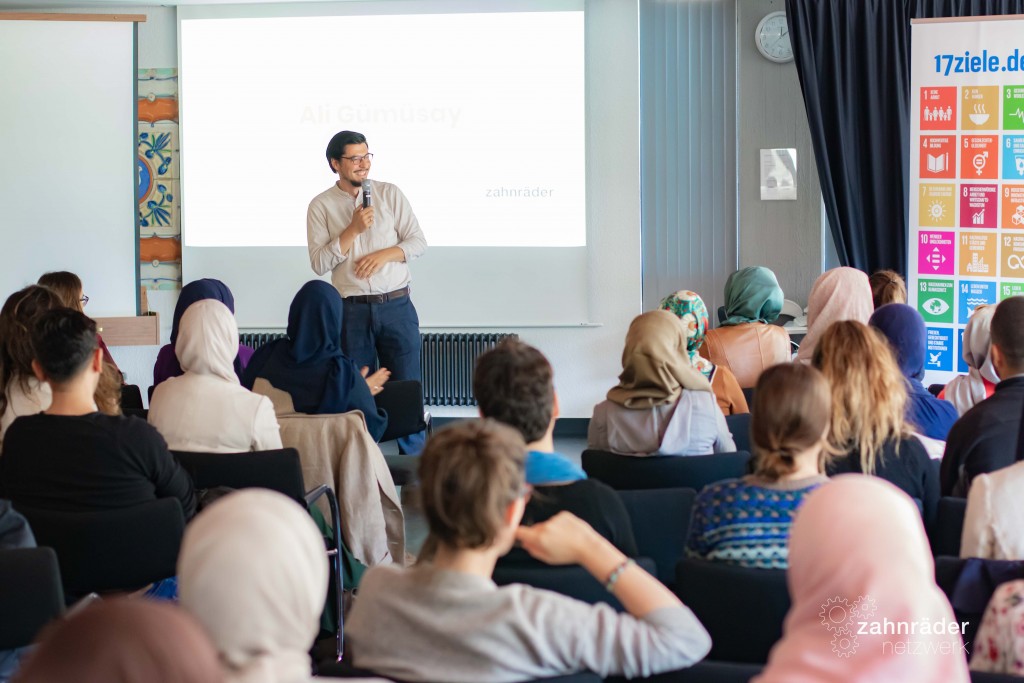
First network meeting: Tackling Grand Challenges
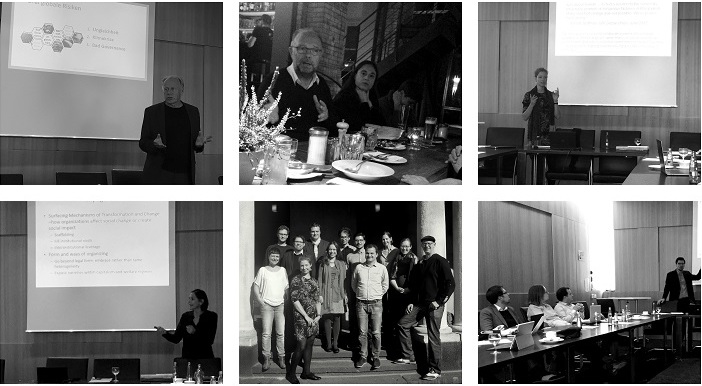 We had our first network meeting in Hamburg on October 4/5, 2018, to bring together research on grand challenges and new forms of organizing. Our members engaged with questions around ecological, social and governance concerns by discussing papers with topics ranging from self-learning algorithms to sanitation in rural India.
We had our first network meeting in Hamburg on October 4/5, 2018, to bring together research on grand challenges and new forms of organizing. Our members engaged with questions around ecological, social and governance concerns by discussing papers with topics ranging from self-learning algorithms to sanitation in rural India.
We invited two expert scholars to share their views and research on grand challenges. Johanna Mair, professor at the Hertie School of Governance, spoke about combining and bridging rigor and relevance. She also presented findings on the relationship between innovation and scaling, depicting innovation as an investment and scaling as potentially creating value and impact. Juliane Reinecke, professor at King’s College London, presented work on sustainable collective action – in contrast to ceremonial commitment – in the aftermath of the fatal Rana Plaza building collapse. She described the wickedness of the challenge for practitioners and researchers alike, as “one cannot first understand, then solve” and the “formulation of a wicked problem is the problem” (Rittel & Webber, 1973). Scholars in the field then engage with complexities, capture multiple, contradictory accounts of events from diverse respondents, and have to make sense of them.
At the same time, we also extended the conversation to politics and practice. Bernd Ulrich, deputy chief editor of the German newspaper Die Zeit, gave a dinner speech on central problems of our time: climate change as well as shifting global power dynamics and national consequences. His speech was also a plea for action to defend normality radically and to advocate for a transformative instead of incremental politics. Echoing the notion of grand challenges, he noted that the problem for politics is that challenges are conceived as additive instead of as inter-related. Jürgen Trittin, former German minister and current member of federal parliament, addressed similar concerns around inequality, climate change and bad global governance. He emphasized the interconnectedness between various social challenges and identified climate change as the key threat multiplier for these challenges. His talk ended with a plea for a European response strategy.
We finished our two-day meeting reflecting on how research can have more practical relevance to address these central concerns. We will take this up in our second meeting in March in Amsterdam.
Some impressions were shared via Twitter here. If you are interested in our research and wish to explore potential collaborations, please contact us here.
Sharing Economy, Grand Challenges & Refugees
 New piece on the sharing economy, grand challenges, social movement, platforms, and refugees fresh out at Academy of Management Discoveries. My commentary on the article by Martin Kornberger, Stephan Leixnering, Renate Meyer & Markus Höllerer.
New piece on the sharing economy, grand challenges, social movement, platforms, and refugees fresh out at Academy of Management Discoveries. My commentary on the article by Martin Kornberger, Stephan Leixnering, Renate Meyer & Markus Höllerer.
Excerpt
The sharing economy is frequently linked to companies such as Airbnb and Uber that enable “collaborative consumption” (Botsman & Rogers, 2010), that is people make their personal belongings (e.g., vehicles, homes) or services (e.g., workforce) available to virtual strangers through community-based online services (Hamari, Sjöklint, & Ukkonen, 2016; Mair & Reischauer, 2017). Platform companies are not sharing their resources, but share other people’s resources. In these cases, resources that were private like a home or car become goods or services. A novel reservoire of goods and labor is marketized and employed in the capitalist system through digital technologies. Sharing is an increase in the utilized capacity of resources.
However, these types of sharing have a bitter-sweet aftertaste, because they effectively sell – not share – temporarily resources through platform economies without a shared sense of caring. By combining two organizational types, platform and social movement, to a novel form of organzing, the authors potentially present a means to allow the sharing of resources without the surplus value being taken by few companies. Value and values are aligned into a value(s) pursuit (Gümüsay, 2017) and sharing becomes both a transaction and interaction as well as an economic and moral activity.
Hybrid organizing in the face of grand challenges
This  article appeared on the Copenhagen Business School the Business of Society blog.
article appeared on the Copenhagen Business School the Business of Society blog.
Sharing is not always caring
In 2015, thousands of refugees arrived in Europe. A recent paper by Kornberger and colleagues (2017) zooms in on the “Train of Hope”, a civil society organization that organically gained exclusive operational command at Vienna’s main train station during this refugee crisis. The paper is a critical reflection on much of the current sharing economy ‘hype’. In contrast to cases of “collaborative consumption”, where platform companies such as AirBnB or Uber offer (share?) other people’s resources, this is an exemplary case of engagement and sharing without expectations for direct individual return: a sharing of a concern for social well-being. Sharing then becomes caring. …
For the full article please visit the Business of Society blog.
Book Review: The Society of Singularities
New review of the book “The Society of Singularities” by Andreas Reckwitz published in Organization Studies.
“Reckwitz offers a grand social theory of late modernity. His quest is to comprehend and conceptualize the social present. The gist of the book’s argument is that in modernity a societal structural transformation has occurred: the societal logic of the particular has taken precedence over the logic of the general. Reckwitz denotes the distinctive character, which is neither changeable nor comparable, as singularity. Both individuals and collectives, such as groups, organizations, or social movements, may seek exceptionalism. We curate and perform our lives and strive for authenticity, attraction, and positive valuation to generate short-term affective experience and long-term cultural value. This fits squarely with core organization studies concerns and arenas of attention of ‘organizations, organizing and the organized in and between societies’ and has the potential to shape organization theories’ depiction and prediction of social reality.”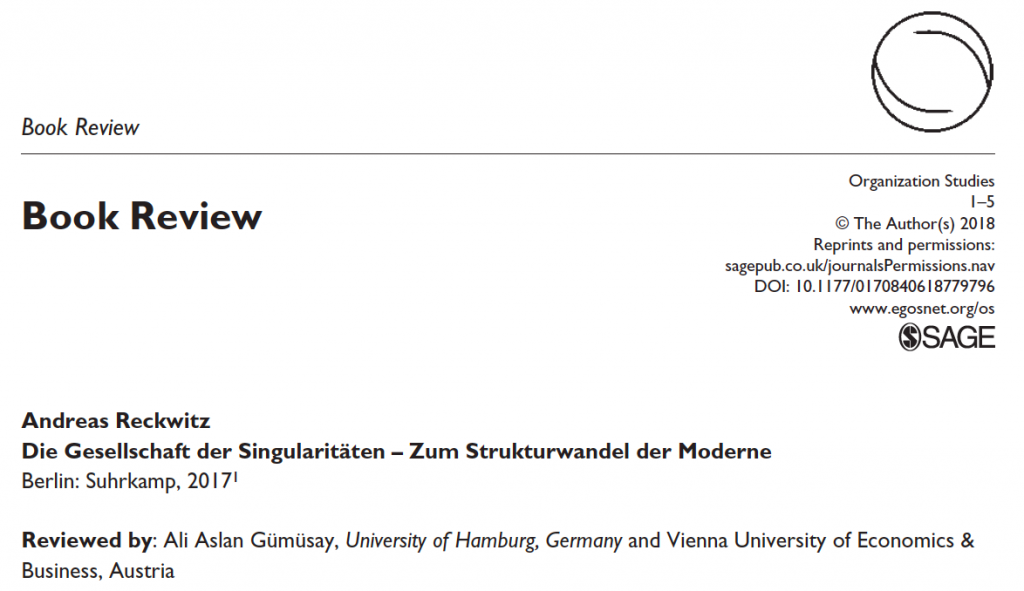 Unfortunately, wonderful comments by Andreas Reckwitz himself, Daniel Geiger and Oskar Piegsa had to be taken out during the review process. So I’d like to share them here:
Unfortunately, wonderful comments by Andreas Reckwitz himself, Daniel Geiger and Oskar Piegsa had to be taken out during the review process. So I’d like to share them here:
Andreas Reckwitz: “The motive of my book was to clarify which consequences the reversal of a phenomenon at the margin into a dominant structure has in society. What happens if the orientation towards the singular, the extraordinary, the authentic – which in classical, industrial modernity was a side-phenomena – turns in late-modernity into a structure everything and everybody strives for and expects?”
Daniel Geiger: “For me this book is a perfect example to prove the analytical richness and explanatory power of a practice lens for studying organizations, the organized and societies. Reckwitz manages to connect the texture of different practices which cannot be studied in isolation – something that is often forgotten in recent practice-based studies. The idea of singularization and the valorization practices that are practiced in economics, culture, and life-stiles have a great potential to explain late modern societies. For me the book holds up a mirror to my own life. In a sense I would argue it is the new “Social Systems” (Luhmann, 1995) for the 21st century.”
Oskar Piegsa: “In Reckwitz I discovered quite a few theories that have been floating around in journalism and in the humanities in recent years. I found traces of David Brooks’ (2000) bourgeois bohemians and of Boltanski and Chiapello’s (1999) ‘Le nouvel Ésprit du Capitalisme’, to name only two. This is not to suggest his work is a meta-study or epigonal. ‘Singularities’ is highly original and its greatest purpose is in providing a grand theory that seems to explain a lot of what is happening today in culture and society. Where others described parts of contemporary culture, Reckwitz tackles the whole thing, all of it. However, I wonder if Reckwitz doesn’t overestimate the value of narrative, originality, and creative work. He argues that every college graduate today works in some way creatively, adding immaterial value to material things. I doubt that. And I’m afraid that categories such as ‘creative work’ or ‘cultural industries’ will lose their descriptive value if we apply them to, well, everything.”